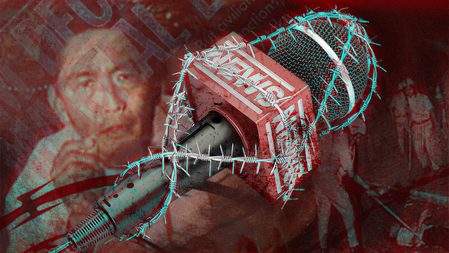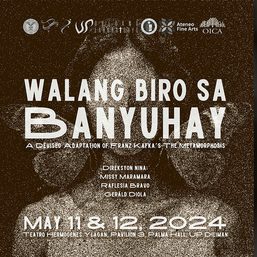SUMMARY
This is AI generated summarization, which may have errors. For context, always refer to the full article.
![[OPINION] Who’s afraid of books?](https://www.rappler.com/tachyon/2021/10/ispeak-whos-afraid-of-books-sq.jpg)
Libraries are repositories of knowledge. Although there is an abundance of information that can be found online, institutions such as libraries continue to play an important role in providing relevant resources for information-seekers. Academic and school libraries in particular are treated as spaces where academic freedom is practiced and critical thinking should be fostered.
A few weeks ago, books by the National Democratic Front of the Philippines (NDFP) were being pulled out and surrendered to the AFP from the libraries of the Kalinga State University, Isabela State University, and Aklan State University in their so-called attempt to prevent “communist infiltration” inside their schools.
Many, especially those in the academic community, decried such measures as an affront to academic freedom, akin to the book burnings during the reign of Nazis in Germany. As a student of library and information science, I couldn’t agree more.
The incident confirmed what contemporary literature on library and information science or LIS have been saying about how these institutions are not external to society and its contradictions, but are integral parts of it.
On censorship
Contemporary LIS literature also talks about the power that libraries and archives have in shaping normative thinking as well as counter-consciousness. Such power emanates from societal relations from which these institutions are built. Those who are in power generally control the institutions, including libraries and archives. That is why discussions on the power of these institutions mainly focus on their capacity to dominate the narratives.
While libraries and archives have the power to dominate and keep records, they also have the capacity to empower the powerless. This dual power shows the innate contradictions in these institutions.
One component of its power is the ability to select, acquire, or weed out materials from its collection. But such powers can be subject to abuse through the act of censorship.
According to the American Library Association, censorship is “the suppression of ideas and information that certain persons — individuals, groups, or government officials — find objectionable or dangerous.” There are also subtle or passive forms of censorship such as the exclusion of certain materials for acquisition or the over-representation of other materials.
The discourse on censorship is nuanced. There are those who argue for a need to regulate materials especially if it goes against national security and interest. While it is a fair argument to make, history has proven that it is more harmful to any society to deprive its people of information. Censorship also undermines the capacity of people, in this case, the youth, to critically assess the contents of literature.
History of censorship
Our colonial history saw the censorship of ideas that promote a scientific world outlook, self-determination, and liberation. The indigeneous culture of the indios was destroyed and assimilated into the colonial superstructure. During American colonization, even the mere display of the flag was deemed illegal, and performances and writings that promote patriotism were banned.
In the height of the Cold War, anti-communist hysteria was running high and progressive politics was deemed subversive and was suppressed. The Anti-Subversion Law was a draconian measure implemented in 1957 that attempted to quell any form of dissent and the proliferation of radical thought. Government heavily censored books and materials, even those that merely mention Marx, socialism, communism, or any reference to revolution or radical thought. Owning such materials can subject anyone to suspicion of being a communist.
Even in academic libraries such as in the University of the Philippines, Marxist books and publications were either discarded or uncataloged. Faculty members and students who wrote about national sovereignty, the history of peasant war in the Philippines, the need for a revolution in culture, were put under surveillance by the Commission on Anti-Filipino Activities.
Another period of heightened censorship was during Martial Law. Marxists books, as well as other progressive materials, were also prohibited. Ownership of such materials could subject one to arrest and even torture. Libraries hid or removed such documents from their collections. Even owning mimeograph machines was heavily regulated to prevent the publication of subversive pamphlets and readings. Media outlets critical of the government were shut down.
Despite heavy censorship, the government failed to quell the nationalist ferment among intellectuals. Students and faculty found ways to undermine censorship by smuggling radical books and readings from progressive allies. Even the librarians and library science students that were part of the nationalist ferment in the ’60s discreetly cataloged Marxist books and put them into circulation. Librarians during Martial Law discreetly preserved subversive documents, such as in the University of the Philippines, which are now included in its Radical Papers Collection.
Currently, with the passage of the Anti-Terror Law, it seems that the Duterte government is resorting to old Marcosian tactics to quell its critics.
Banned books
Many of the materials pulled out from the libraries of Kalinga State University and Aklan State University were published by the National Democratic Front or NDFP. Albeit declared as a terrorist organization by the Duterte administration, the NDFP continues to be recognized internationally as a belligerent organization waging revolution.
Some of the books were about the Comprehensive Agreement for the Respect for Human Rights and the International Humanitarian Law or CAHRHIL, a bilateral agreement between the government and the NDFP regarding the conduct of war between the two forces. There were also books that tackled the peace talks and the socio-economic reforms demanded by the revolutionary forces, which the Duterte administration unilaterally put to a halt.
As someone who has read these materials for classes in college, and as a labor researcher, I don’t see anything harmful with the contents of these materials. These materials actually tackle legitimate concerns of various sectors, especially the poor working class. What’s wrong with national industrialization and workers’ rights? What’s wrong with land reform? What’s wrong with asserting national sovereignty? What’s wrong with aspiring for genuine lasting peace? In a desperate attempt to prevent communist infiltration in schools, they are compromising the academic freedom of students and faculty.
Only those who are insecure about the correctness of their own ideas fear somebody else’s. Historically, it is fascists that have always been afraid of radical and scientific ideas. They fail to see that it is not radical ideas nor radical materials that pushes people to resist, but rather, the unjust system that compels people to struggle and seek fundamental change.
Librarians, archivists, and the whole academic community should oppose these acts of censorship. We have to defend academic freedom against those that try to threaten it.
More importantly, we have to realize our duty to serve the people beyond the confines of the academe. Only by integrating ourselves with the oppressed sectors of society can our theories be put to practice to make actual change. – Rappler.com
Orly Putong is a student taking up Library and Information Science. He is also a volunteer researcher for the Ecumenical Institute for Labor Education and Research or EILER, which advocates genuine trade unionism.
Add a comment
How does this make you feel?
![[OPINION] Defend freedom of thought! Hands off our libraries!](https://www.rappler.com/tachyon/2021/09/ispeak-libraries-1280.jpg?fit=449%2C449)


![[OPINYON] Tungkol sa naging viral na social media conjecture](https://www.rappler.com/tachyon/2024/07/thought-leaders-conjecture-07262024.jpg?resize=257%2C257&crop_strategy=attention)

![[EDITORIAL] Apat na taon na lang Ginoong Marcos, ‘di na puwede ang papetiks-petiks](https://www.rappler.com/tachyon/2024/07/animated-bongbong-marcos-2024-sona-day-carousel.jpg?resize=257%2C257&crop=280px%2C0px%2C720px%2C720px)

![[OPINION] How can teachers develop a reading habit among learners?](https://www.rappler.com/tachyon/2024/07/imho-reading-habit.jpg?resize=257%2C257&crop_strategy=attention)





![[OPINION] From ‘Puyat’ to ‘Tulog’: Clout-chasing street signs disrespected history](https://www.rappler.com/tachyon/2024/07/gil-puyat-july-26-2024.jpg?resize=257%2C257&crop=389px%2C0px%2C1080px%2C1080px)


![[Time Trowel] Yamashita gold is a myth, and treasure hunting is not archeology](https://www.rappler.com/tachyon/2024/06/myth-yamashita-treasure-june-14-2024.jpg?resize=257%2C257&crop=435px%2C0px%2C1080px%2C1080px)
There are no comments yet. Add your comment to start the conversation.